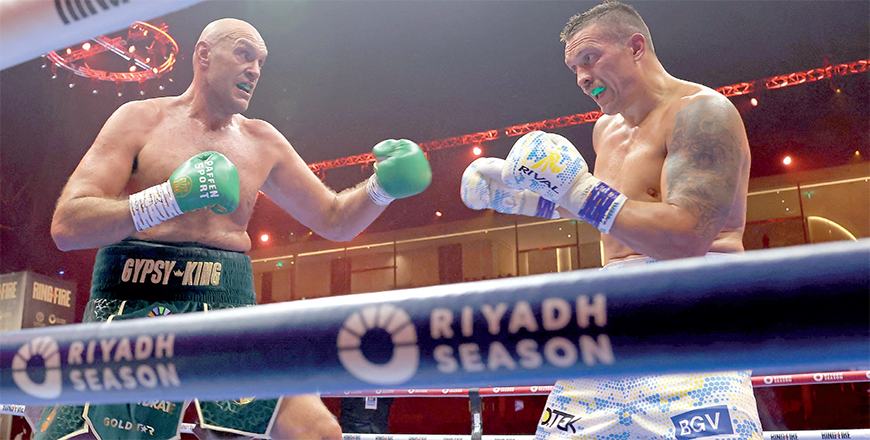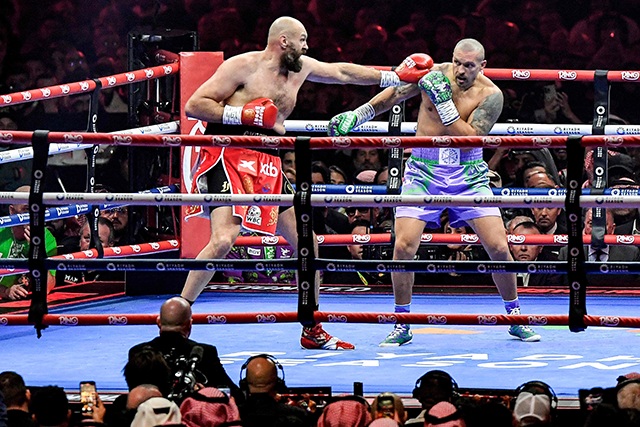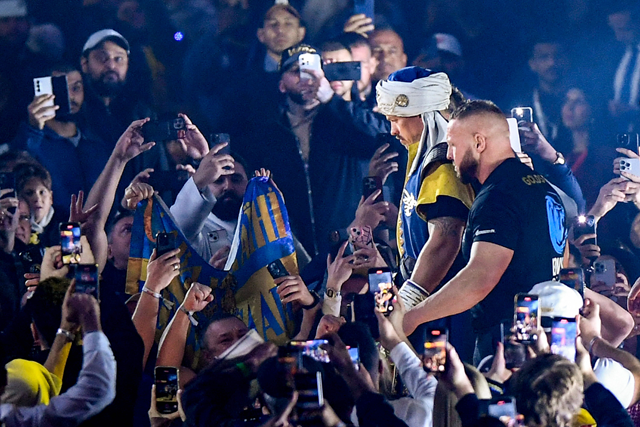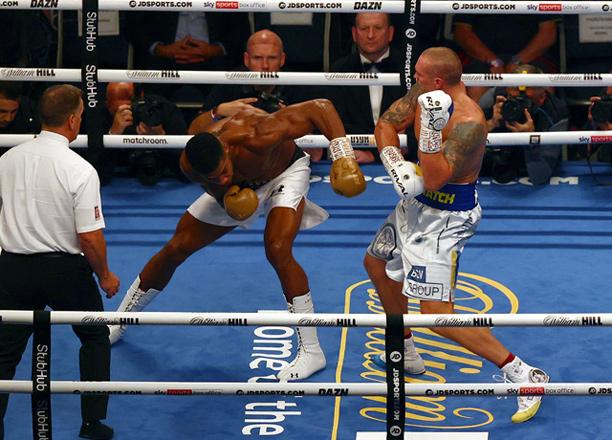You are here
GLANCEThe greatest, the baddest and the best— six undisputed heavyweight champ
By AFP - May 20,2024 - Last updated at May 20,2024

Ukraine’s Oleksandr Usyk (right) fights against Britain’s Tyson Fury during a heavyweight boxing world championship fight at Kingdom Arena in Riyadh, Saudi Arabia on Sunday (AFP photo)
RIYADH — Oleksandr Usyk beat Tyson Fury early on Sunday in the first undisputed heavyweight clash since 1999.
The ever-bubbling alphabet soup of boxing sanctioning bodies — the winner in Riyadh becoming the first four-belt heavyweight champion — means that becoming, and remaining, undisputed champion requires not just skill and toughness in the ring, but acumen outside it.
Usyk joined a select group. Here AFP Sport picks six of the undisputed best.
Jack Dempsey (Undisputed champion from January 1921 to September 1926, 3 defences
The hard-hitting and aggressive Jack Dempsey became the first official world champion at the start of 1921 when the American National Boxing Association and the powerful New York State Athletic Commission agreed to recognise a world champion. The “Manassa Mauler”, with a right nicknamed “Iron Mike” and a left hook dubbed “Big Bertha” had become “lineal” world champion, in boxing parlance “Beating The Man to become The Man” when he bludgeoned Jess Willard in 1919. But the newly-minted official status helped turn his first sanctioned defence, against Frenchman Georges Carpentier, into the first “million-dollar fight”. He defended his title twice more, before losing twice to Gene Tunney and retiring.
Joe Louis (June 1937 to March 1949, 26 defences)
After the first African American heavyweight champion, Jack Johnson, lost to Willard in 1915, no black boxer fought for the title until 1937, because Joe Louis, who had just lost to Max Schmeling was a more palatable challenger for Cinderella Man James Braddock’s title than the German. Louis knocked out Braddock to claim a title he held for record 26 defences over more than 12 years. The most famous was the first-round revenge demolition of Schmeling at Yankee Stadium in 1938. Louis was smart, calm, technically sound and packed a ferocious punch. “Everyone has a plan until they’ve been hit,” he said.
Rocky Marciano (September 1952 to April 1956, 6 defences)
After war service, an undistinguished amateur career and a baseball tryout with the Chicago Cubs, the boxer, who changed his name from Rocco Marchegiano, turned professional just before his 25th birthday in 1948. He fought 49 times as a pro, winning every fight, 43 of them by knockout. Only 5ft 10in tall (1.78m), Marciano was relentless, resilient and a thunderous puncher. He was 29 when he got his title shot, flooring Jersey Joe Walcott in the last round with a straight right: His “Suzie Q”. Having pummelled an ageing Louis on his way up, knocked out the 39-year-old Walcott in the first round of their rematch, Marciano quit for good at 32 after stopping 42-year-old Archie Moore.
Muhammad Ali (February to September 1964, February to April 1967, October 1974 to February 1978, 10 unified defences)
The Greatest only fails to match Louis for total defences because he was effectively banned from boxing from March 1967 to October 1970 for his opposition to the military draft for the Vietnam war. The Louisville Lip, who later declared “I’m so mean, I make medicine sick”, had already upset the American establishment by changing his “white man’s name”, Cassius Clay. After toppling Sonny Liston to win the title at 22 in 1962, he lost his undisputed status for taking a rematch with Liston. Ali defended his remaining titles seven times, before reunifying the division in 1966 against Ernie Terrell. At 25 he was banned. Ali was 29 by the time he got his crack at regaining his world titles, against Joe Frazier in 1971, but suffered his first loss. It took until 1974, and his victory over George Foreman in the “Rumble in the Jungle”, a fight that highlighted Ali’s craft, cunning and courage, to reclaim his crowns. He lost his titles to Leon Spinks in 1978, won some of them back in a rematch seven months later, but, aged 38, lost a reunification bout to Larry Holmes in 1980. By then Ali had won over all but his most determined critics.
Joe Frazier (February 1970 to January 1973, 4 defences)
Joe Frazier’s often electrifying trilogy against Ali was boxing box office as two greats, with contrasting styles and personalities and opposing political views went toe-to-toe. “Smokin’ Joe” preferred close-quarters attack, but his constant bobbing made him hard to hit. In their opener, “The Fight of the Century” — a gruelling 15-rounder — he decked Ali with the devastating left hook he called his “heat-seeking missile”. By the rematch in 1974, George Foreman had taken Frazier’s title. Ali not only floated like a butterfly but clinched like a crab and won on points. In the 1975 “Thrilla in Manilla” Ali unleashed a merciless barrage in the 13th. The referee stopped the fight in the next round. Frazier, 30 at the time of that bout, only fought twice more.
Mike Tyson (August 1987 to February 1990, 6 defences)
By the time he was 13, Mike Tyson had been arrested 38 times. In 1986, at the age of 20 years and four months, he was the youngest heavyweight champion in history. Even though he was only 1.78m, his approach was vicious intimidation. He won his first 19 professional fights by knockout. Smart but troubled, his wild lifestyle took a toll. He was ambushed by Buster Douglas in 1990. Although he regained two belts in 1996, he immediately lost to Evander Holyfield. At his brief, snarling, sneering peak, Tyson lived up to his billing as the “baddest man on the planet”.
Related Articles
RIYADH, Saudi Arabia — Oleksandr Usyk won his heavyweight championship rematch against Tyson Fury by unanimous decision overnight on Saturda
RIYADH, Saudi Arabia — Oleksandr Usyk has vanquished all before him but there are signs of frustration that the quietly determined Ukrainian
LONDON — Anthony Joshua said he was “110 per cent” likely to activate a rematch clause with Oleksandr Usyk after losing his world heavyweigh














